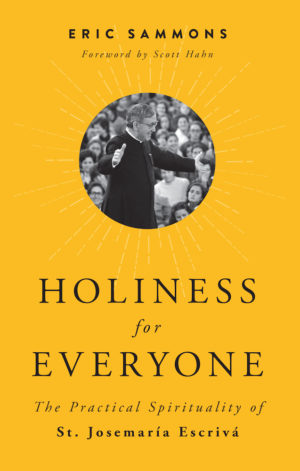|
Getting your Trinity Audio player ready...
|
What’s the first thing you think of when you hear “Opus Dei?” Is it the infamous portrayal of an albino Opus Dei monk assassin in the historically and factually challenged The Da Vinci Code? Or perhaps accusations of the apostolate’s secretive nature? Or, more seriously, allegations of cult-like behavior within the group? Maybe you just think of it as a club for rich Catholics.
For a lot of people, both Catholic and non-Catholic, Opus Dei leaves a negative impression, whether fairly or unfairly. This is also true among many traditionalist Catholics, and their criticisms are also directed at the founder of Opus Dei, St. Josemaría Escrivá. Typically they focus on two main issues: St. Josemaría’s supposed hyperpapalism, and Opus Dei’s apparent lack of concern about the liturgy and lack of support for the traditional Latin Mass.
That St. Josemaría was a strong defender of the papacy and the need for Catholics to be obedient to the pope is accurate. He once wrote, “For me, in the hierarchy of love, the Pope comes right after the Most Holy Trinity and our Mother the Virgin (Conversations with Josemaría Escrivá 46) and “You must love, venerate, pray, and mortify yourself for the Pope, and do so with greater affection each day. For he is the foundation stone of the Church” (The Forge 134). These quotes can be understood in a way which still acknowledges that popes can and do fail in their apostolic ministry at times, but on their face they clearly elevate the papacy to ultramontanist heights. There’s no question that St. Josemaría strongly endorsed an almost-blind following of the pope.
Orthodox. Faithful. Free.
Sign up to get Crisis articles delivered to your inbox daily
This unquestioning obedience, which is practiced by Opus Dei today, makes many traditional Catholics uncomfortable. Such discomfort is ironic, since a strong sense of obedience to the pope was an indelible part of the ethos of the pre-Vatican II Catholic Church. But times have changed. Now most traditionalists (rightly) see that popes can and do make mistakes and that Catholics under them—both cleric and lay—have a right and sometimes even a duty to call out those mistakes if the salvation of souls is in jeopardy. This doesn’t mean traditionalists have abandoned obedience, but they now understand that it cannot be unquestioning in the face of scandals and errors coming out of the Vatican.
The other area of traditionalist criticism is that Opus Dei does not concern itself with the liturgy and doesn’t support the traditional Latin Mass. It’s true that Opus Dei priests exclusively celebrate the Novus Ordo and do not publicly enter into the “liturgy wars” nor advocate in any way for the traditional Latin Mass. For example, to my knowledge no Opus Dei priest lodged any criticisms of Traditionis Custodes, the motu proprio from Pope Francis that sought to restrict the celebration of the TLM.
As someone who wrote a book on the spirituality of St. Josemaría Escrivá but also considers himself a traditional Catholic, I take these criticisms seriously. I wrote the first edition of my book Holiness for Everyone: The Practical Spirituality of St. Josemaría Escrivá before I became more traditional, and I’ve had many people ask me if I’ve changed my views of St. Josemaría since I wrote the book. The short answer is no. But what do I make of these criticisms of the Spanish Saint and the apostolate he engendered?
I would argue that both traditionalist criticisms of St. Josemaría Escrivá suffer from anachronisms. We cannot remove someone from their times, insert them into ours, and then judge them based on our current reality. When St. Josemaría was alive, the vast, vast majority of Catholics had a hyperpapalist view of the papacy, having lived in an era when every pope in memory was a staunch defender of the Catholic Faith as it has been handed on to us.
St. Josemaría’s attitude toward the papacy, then, very much made him a man of his times. A well-known contemporary of the Spanish saint was Archbishop Marcel Lefevre, the founder of the traditionalist Society of St. Pius X. He also held strongly ultramontanist views, perhaps even more so than St. Josemaría did. Yet by the 1980’s (a decade after St. Josemaría died) Lefevre was disobeying Pope John Paul II in spite of those strong beliefs about the papacy.
What would St. Josemaría do if he lived in the era of Pope Francis? There’s no way to know for sure. What would St. Josemaría do if he lived in the era of Pope Francis? There’s no way to know for sure. Tweet This
The second criticism—that Opus Dei doesn’t support the TLM—ignores the reality of today’s Church. Almost every single Catholic religious order and apostolate in the world today exclusively celebrates the Novus Ordo, and very few enter into the contentious liturgy wars. Further, the vast majority of Opus Dei priests celebrate the Novus Ordo Mass far more reverently than is the case at the typical Catholic parish. So while Opus Dei might not explicitly advocate for a certain liturgical position, how its priests celebrate the Mass does lean toward a more traditional manner.
Further, although Opus Dei doesn’t publicly defend the TLM, we don’t know whether St. Josemaría would if he were still alive today. He deeply loved the traditional Latin Mass. It was the Mass he grew up with, which formed him, and which he celebrated his whole priestly life. In fact, after the Novus Ordo was established in 1969, he obtained permission to continue to say the TLM, which he did for the last five years of his life (he died in 1975).
There’s no question he would have been deeply saddened by Traditionis Custodes, but would he have complained publicly? It’s a hypothetical that can’t be answered.
But we do know this: his spirituality, developed decades before Vatican II, is applicable to all Catholics. Although many think the “universal call to holiness” a Vatican II invention, it was the kernel of St. Josemaría’s preaching and it has a deep history in the Church. St. Josemaría himself, who passionately advocated for and popularized the concept, readily acknowledged he was not its inventor. It’s something that traces back to the earliest days of the Church, and then was promoted by figures such as St. Francis de Sales and St. Thérèse of Lisieux.
By this author:
-
Holiness for Everyone$17.95
St. Josemaría’s spirituality is, simply put, practical advice for how a Catholic can strive for holiness in the midst of the world—something all Catholics, whether or not they are “traditional,” should desire. As St. Josemaría wrote, “these world crises are crises of saints” (The Way 301). Our Church and our world are full of crises, and so our battles are important. Instead of trying to find ways that this great modern spiritual master might not fully fit into our “side” in today’s battles, we should instead look to his timeless advice on how to become holy in a world that desperately needs saints.

